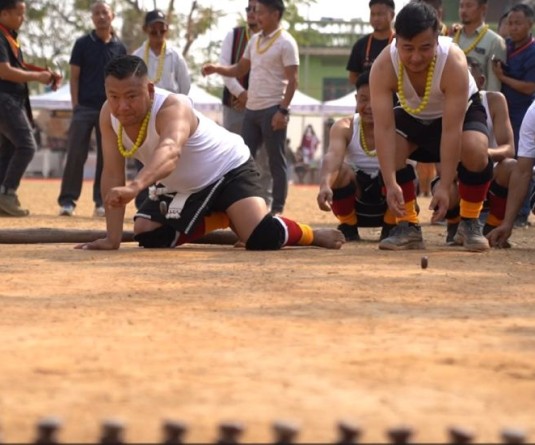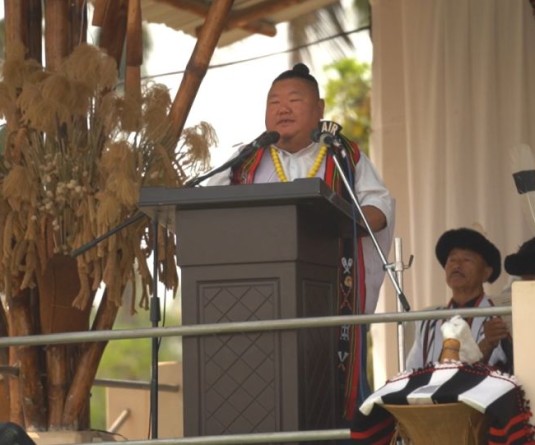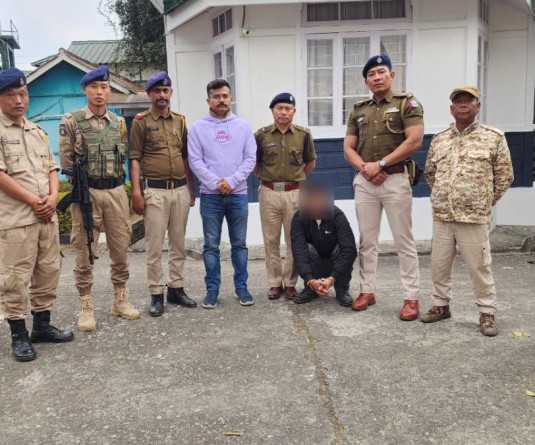A Seminar on 'Career Counselling and Entrepreneurship’ was held for Persons with Disabilities (PwDs) at the Conference Hall, District Hospital Dimapur on April 26. (Morung Photo)

Morung Express News
Dimapur | April 26
‘Adaptability, communication skills, emotional intelligence, critical thinking and creativity’ are essential skills for persons with disabilities (PwDs) to develop for their rehabilitation and inclusion in the mainstream of today’s world. Abdul Saleem TK, Rehabilitation Officer at theNational Career Service Centre for the Differently Abled (NCSC-DA) Dimapur, addressed these concerns during the ‘Seminar on Career Counselling and Entrepreneurship’for Persons with Disabilities (PwDs) which was held today at the Conference Hall, District Hospital Dimapur.
The seminar was organised by Prodigals’ Home supported bythe LIC Housing Finance Ltd (LIC HFL) Sarthak Initiatives as part of its corporate social responsibility (CSR), in collaboration with the Office of the State Commissioner for Persons with Disabilities (SCPD) and the National Career Service Centre for the Differently Abled (NCSC-DA) Dimapur.
It covered three sessions on‘Entrepreneurship,’‘Disability Sensitisation and Rehabilitation,’and ‘Financial Assistance.’
The event saw the participation of 32 persons with disabilities (PwDs), identified through a community-based survey conducted by Prodigals’ Home in December 2024 across the districts of Dimapur, Chümoukedima, and Niuland, targeting adults between the ages of 18 and 40.
Debunking common misconceptions about disability, Rehabilitation Officer Abdul Saleem TK stated that while people with disabilities are often perceived as always dependent, many are,in fact, independent and highly capable.He challenged the notion that disability isseen as inability,emphasising that, like anyone else,PwDs possess a wide range ofskills and talents.
He also noted that the Rights of Persons with Disabilities (RPWD) Act, 2016 recognises 21 types of disabilities, dispelling the misconception that disability is solely physical. The Act acknowledges invisible disabilities such as autism, dyslexia, and mental health issues, which require equal care and attention.
TK further addressed the false belief that PwDs cannot marry or raise families, a perception that often limits their social acceptance. He highlighted that the RPWD Act mandates a 4% reservation in government jobs for persons with benchmark disabilities, and a 5% reservation in all government-funded higher education institutions.
TK discussed the numerous challenges faced by PwDs in India and elaborated on the differences between the 'medical model' and the 'social model' of disability. Unlike the medical model, which focuses on "fixing" the individual, the social model advocates for changing societal structures to ensure full participation by everyone. He also highlighted job placement opportunities and policies aimed at supporting students with disabilities.
Rehabilitation Counsellor at NCSC-DA Dimapur, Vipin Kumar Mishra spoke on the topics of‘entrepreneurship’and‘financial assistance,’emphasising that the focus should be on creating job opportunities rather than simply seeking employment.
He explained that the centre offers non-formal vocational training, provides placement support, and extends outreach services to various categories of PwDs. During the training period, students receive a stipend of Rs 2,500 per month. The centre also organises outreach programmes such as camps, job fairs, and exhibitions, aimed at generating awareness and facilitating rehabilitation services.
Hehighlighted various business ideas suitable for PwDs, including cloud kitchens/ghost kitchens/tiffin services, food trucks, candle and soap making, aquarium shops, CCTV installation, solar vending, VR/AR tourism experiences, pet-sitting businesses, novelty t-shirts, and corrugated box manufacturing.
Speaking on ‘financial assistance’ during the third session, Mishramentioned that the National Divyangjan Finance and Development Corporation (NDFDC) functions as an apex institution for the benefit of persons with disabilities. It is acompanyowned by the Government of India and financial assistance is extended by the corporation at a concessional interest rate for starting any activity contributing directly or indirectly to the income generation of PwDs.
He highlighted prominent schemes which are implemented by NDFDC—Divyangjan Swavalamban Yojana, and Vishesh Microfinance Yojana (VMY) and the Pradhan Mantri Mudra Yojana (PMMY).

During the session, Lanunungsang, Instructor at NCSC-DA informed that by the coming month, a joint venture meeting will be held to discuss on the schemes and loans, which will be rolled out soon after. He encouraged the gathering to approach thedepartment during office hours to have their queries met.
Speaking to the gathering, Ela K, Director of Prodigals’ Home, explained that the initiative targets persons with disabilities (PwDs) involved in any form of livelihood activity. She mentioned that although the survey faced logistical and outreach hurdles, the fieldwork proved to be highly encouraging for the team and underscored the urgent need for stronger inclusion efforts.
She expressed happiness that persons with disabilities are gaining visibility. At the same time, she pointed out that if the community doesn’t come forward, much cannot be accomplished.
She stressed that the goal extends beyond just accessing government schemes. “It is all about empowering the community to come forward, connect with one another, and ensure they are recognised in official records.”
Noting that the programme is for them, she encouraged the participants to feel free and ask questions.
She also highlighted the common belief that there are “very few PwDs” persists mainly because many remain outside formal systems, and stressed that visibility is the essential first step toward true inclusion.
Ashe, who delivered the vote of thanks on behalf of the SCPD, urged participants to move away from the mindset of expecting support without effort, pointing out that the non-disabled community does not attain success merely by virtue of being fullyabled, but through continuous skill development and hard work.
She also reflected on the progress made in the Naga society,stating that “we represent the first generation of persons with disabilities (PwDs) actively standing up for our own rights.” She noted that this marks a significant shift from earlier times when the responsibility largely rested with external supporters such as NGOs.
After the seminar, an onlinejob fair session was held for interested participants, offering work-from-home opportunities at present.






